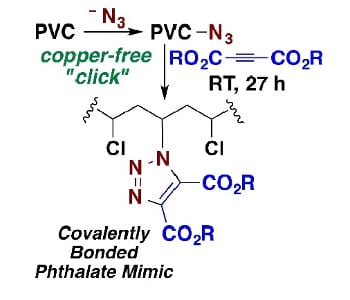 Polyvinyl chloride (PVC) is one of the most widely utilized plastics. It is found in a wide range of consumer products as well as in construction materials and in many medical devices. Pure PVC is a brittle material. Traditionally, phthalate plasticizers are added to make it flexible and easily processed; however phthalates, are implicated as endocrine disrupting chemicals, which leach out, contaminating humans and the environment.
Polyvinyl chloride (PVC) is one of the most widely utilized plastics. It is found in a wide range of consumer products as well as in construction materials and in many medical devices. Pure PVC is a brittle material. Traditionally, phthalate plasticizers are added to make it flexible and easily processed; however phthalates, are implicated as endocrine disrupting chemicals, which leach out, contaminating humans and the environment.
Now, Rebecca Braslau et al. from University of California, Santa Cruz have demonstrated a method to form a covalently attached mimic of phthalates, providing a possible alternative synthesized in a simple and scalable manner.
This very elegant approach to internally plasticized PVC chains uses copper-free azide alkyne click chemistry at room temperature and is likely to be industrially viable as the employed materials and process are cheap, easy to prepare and ecologic. Moreover, the hydrolysis products of these modified PVC materials are expected to be alcohols, avoiding the release of small compounds that can mimic endocrine signaling molecules.

















